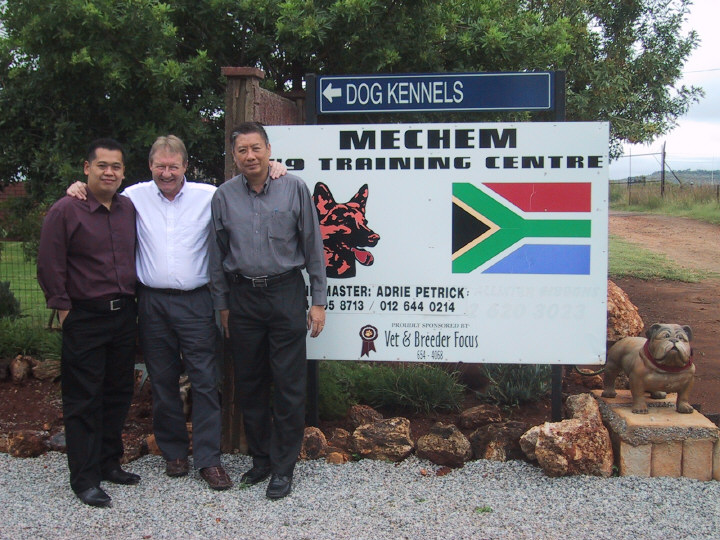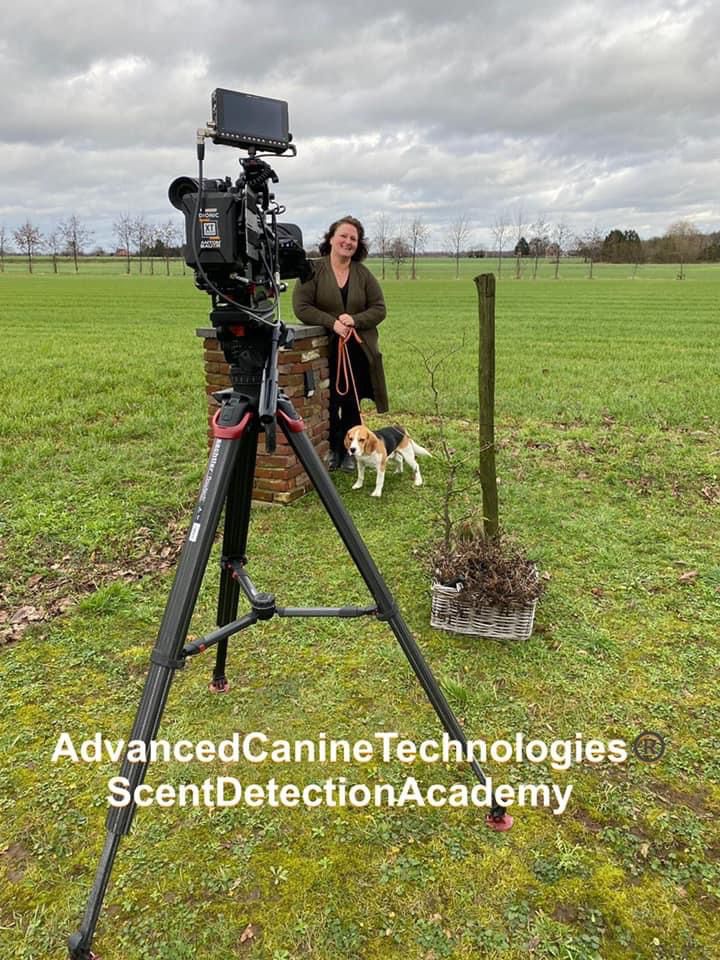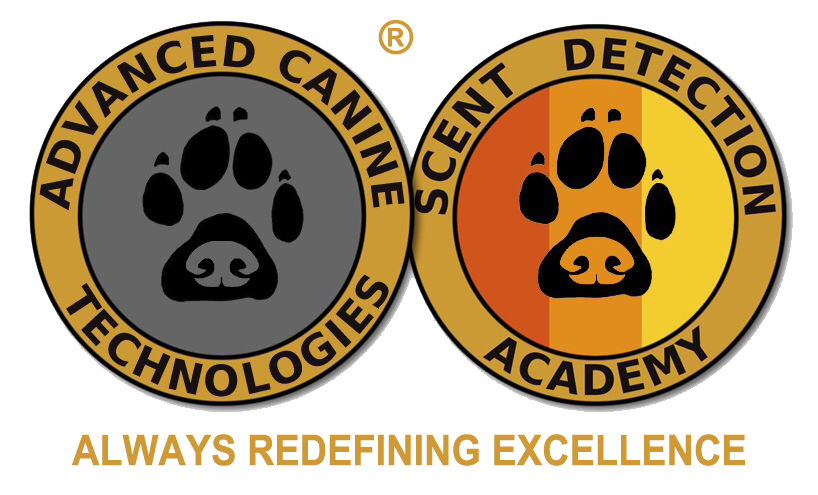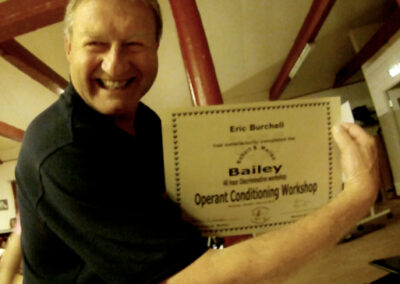A Life in working Dogs
Eric Burchell & Hotsche Luik, joint owners of ACT Advanced Canine Technologies® Ltd have been professional scent trainers for many years.
Eric Burchell, Trainer, Instructor, Consultant

Eric Burchell has a varied and diverse background in the research and development of vapour and particulate detection at trace levels using dogs.
Eric’s previous experience in breeding has given him the opportunity to identify and develop the desirable genetic traits that are most sought after in the well balanced working / service dog.
He is well versed in the advanced technical and tactical aspects of scent discrimination training and deployment. He has endeavored over the last 30 years to make dog work in this field his specialty. Eric has worked closely with scientific government agencies to validate the results and achievements that he has obtained during the years of research and development and has instructed in the area of scent discrimination on a world wide basis…
Specialised Experience
1993 – Present: Instructor/Consultant/Lecturer of canine scent discrimination at trace levels and proven in the vapour detection field.
1993 – 2000 Engaged by Mechem Consultants of South Africa and other agencies to conduct initial six months trials in the UK using the Mechem Explosive Drug Detection System (MEDDS).This programme lasted for seven years under different agencies and has helped develop remote air sampling to become a bona fida detection system officially recognized and used in many parts of the world today marketed under different names.
1997: Contracted in by the Norwegian Peoples Aid to consult on the canine Programme in Angola West Africa. They were using MEDDS technology. Also visited Mozambique to consult on the ongoing canine projects in the south of the country.
1999: Eric was engaged in similar related projects (see 1997) with the United States Government, working with their own research agency DARPA. This was a landmine detection programme using canine verses the latest electrical and chemical technology of the time.
2003: Opened a breeding and training kennel in the Czech republic, ACTK9CZ s.r.o. which has provided dogs world-wide to agencies already on our client list.


2005: ACT DETECTION DOGS (NI) Ltd was formed with a view to initiate a breeding programme and produce potential detector dogs for training to save the time and effort in trying to source dogs elswhere in what was becoming a difficult proposition.
2009-2012: Training and development consultant to NDEA (Seychelles)
2012: Training consultant for Templewood Specialist Services at the O2 London
Company renamed as Advanced Canine Technologies incorporating ACT Detection Dogs
2013: Advanced Canine Technologies and Scent Detection Academy joined forces to work on specialist projects in UK and the Netherlands.
Hotsche Luik
Since the early ninety’s Hotsche Luik MSc has been a dog behaviour and detection specialist involved in diverse research projects.
Within her scope as a behaviour researcher she is known for research amongst other emotions in dogs and other animals. Participating with her expertise in a variety of research work outside her own company.
As a scent detection specialist she has vast experience in every part of general nosework, combining searching, tracking and detection.
Within this field of expertise she also started in the 1990’s teaching educational programs for people who at that time were working professionally with search, track or detection dogs.
Because of the growing interest in this specific discipline she decided to broaden the scope for people working in this field to be able to get more professional knowledge, create the same opportunities for every serious dog owner to participate in these educational programs, lessons, clinics, lectures, workshops to complete Scent detection education given at a professional level.
Workshops for fun, to detect human blood, search for paper money or for truffle, are some examples of the five day workshops for interested students.

Her experience, with this field of research and co-operation in diverse project’s are endless.
Some examples;
Interaction with biologists and so called eco-dogs. These dogs are used to find rare animals or plants, or pests. Nowadays bed bugs are a common issue.
Other issues are training dogs to find leakage of natural gas and other environmental substances, mostly by big energy companies.
For some of the projects she worked on she was required to sign a declaration of confidentiality.
In crime scene as well as in missing person search work Hotsche has trained some specialized dogs able to target the scent on less obvious items.
She was one of the first serious dog trainers in the Netherlands who successfully was able to initiate the training of diabetes alert dogs. These dogs are as far as training goes an exception to other search or detection dogs. They are personally identifiable dogs, who should be compensated by insurance, which in several countries is not the case yet. To make a big step in the right direction Hotsche is the only Dutch member of the International Diabetes Detection Working Group, involved in research and making a protocol and list of demands to training these dogs.
She has made many public appearances on several TV and radio shows mostly due to her very specific scientific molecular research to scent detection and particularly specializing in bio-medical detection. Training a dog to detect an illness is not the most difficult thing to do, training a dog to detect the smallest change in a molecular or microbiology area is work for specialists and an art form!
Research and training of different dogs, each trained to detect a specific kind of cancer was one of the first medical training programmes Hotsche ever started with. This broadened next to several cancer types, and other neurological diseases, moulds, bacteria, and other illnesses.

She was the first trainer in the world to train a dog to detect one specific bacteria and detect this bacteria only when this bacteria is producing toxin. This in a laboratory setting as well as practical applications in hospitals and nursing homes, where this bacteria Clostridium difficile, can cause huge problems.
This scientific research was published in the leading scientific magazine The British Medical Journal. Unique in this department.
HL Scientific Research Bacteria Detection Published in British Medical Journal
She started the Scent Detection Academy many years ago, in which she now works with Eric Burchell. It offers a selection of different unique opportunities, lectures, seminars, clinics and education programs and workshops. All are linked to to the use of the dogs nose, in hunting as in every other type of detection, search or tracking by dogs. They both work in a similar way, many resemblances but their own specialisms as well. A very compatible team.

